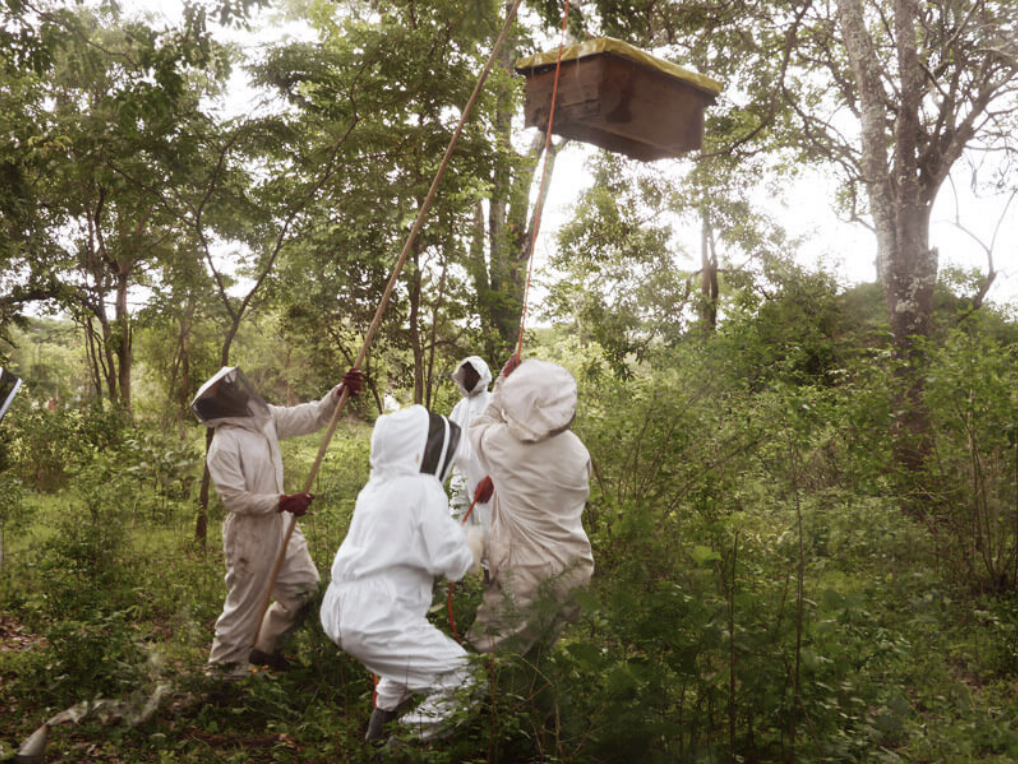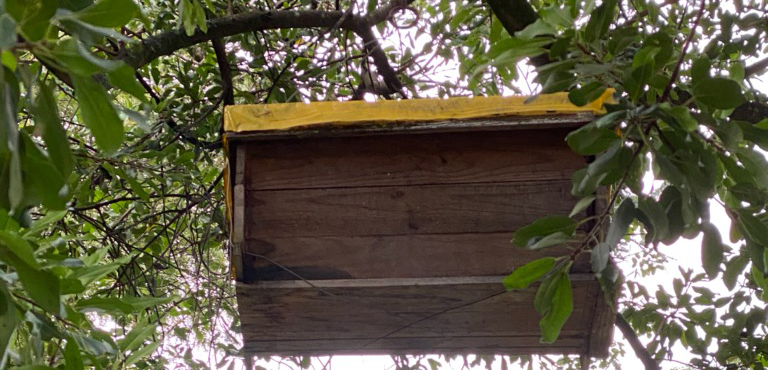
Raised:
$30,625.00Goal:
$40,000.002023 Bee Project Kenya
____________________________________
Update 2023
Phase 4 final phase will be processing and distribution of Honey
All hives have been placed, Geo located and are being monitored monthly. Some areas are getting the much needed rain, others are in a drought situation and will take longer to get established. This year we will be paying truck drivers, bucket collectors, and honey processors, so we can get the honey to market in all the areas. The farmers that have hives on their farms will also get paid for the use of the land, and the protection they provide for the hives. The collected honey will be processed in Karatina and distributed to all Antioch churches in each region to sell and utilize for their needs. The cost of processing (jars, labels, gloves, screens, transportation/shipping etc…) is paid back to Karatina to keep the operation going, all additional proceeds are utilized in each church to provide food and needed supplies for each community. When the project evolves to the extent of the model in Zambia, it will be self-sufficient and provide much needed relief for all the Antioch Churches and Communities. All funding for this year’s bee project will go to seed the operation and get this final phase completed. We pray the drought stricken areas of Kenya will receive much needed rain. Some areas have been in a drought for the past 4 years.
____________________________________
Update 2022
The Bee Hive project 3rd Phase was fully funded and hives were ordered and assembled in Karatina. All the hives were hung throughout many areas of Kenya early 2022 season. Some areas have had a good response and bees immediately occupied the new hives, especially the Mt. Kenya region. Some of the other regions have had much difficultly due to the continuing drought stricken regions, especially in the eastern region. We are very happy to have recorded a total honey harvest for the 2022 year of 50+ kg or approximately 5 gal (this harvest was due mainly to hives that drooped from their hangers and in need of repair). Only a few hives with a surplus honey in specific regions were processed this first year. Most of the hives are left to grow in strength, especially the first year. We look forward to a bountiful harvest in 2023.
Update 2121
Third Phase Complete
Hives were delivered and assembled in Karatina. We had to secure additional facilities to hold the wood and stage deployment of the hives to each region. Everyone from each region received the allotted hives and started hanging them immediately. We were granted permission to hang hives in some of the National Park zones like the Mt. Kenya region. This is awesome!
Second Phase Complete
The border between Zambia and Kenya has opened. The First (1st) phase of the Bee Project has been funded and initiated. The hives will be on their way to Kenya soon. This is where the project starts taking shape. All the hives will be assembled by the Antioch Baptist ministers and helpers. Then they will be distributed and hung in local forest and farm lands. The plans have been laid, and the process is started. We pray that God will bless the Bee Project for the Kenyan people, like the Zambian people have been blessed by their Bee hives. We now have to proceed to Phase 3 of the process where we will need to have trained individuals from Zambia travel to Kenya and teach our Kenyan brothers the refined art of Hanging Bee Hives, tending new hives and preparing for seasonal harvesting. Phase 3 will be processing and distribution. God is Good. Amen
____________________________________
Covid-19 Update/old news
Due to the worldwide Covid-19 pandemic, the Bee Project is on hold until the borders open back up between Zambia and Kenya. We are focusing much of our relief efforts in providing food and housing for our pastors and their families during this unprecedented time in Kenya. All Bee project donations will be applied to the Bee project when we are allowed to continue with the transportation of the hives to Kenya. We hope this happens by December 2020.</del>
Original Post: The 1st phase of this project has been funded.
The Kerring for Kenya crew took a trip to one of the most successful honey operations in Nodola Zambia. The Kafakumba Trading Center (BeeSweet Honey) is a Christian-owned company that has built a successful honey bee operation utilizing scrap wood and God given honey bees. Founder and missionary philanthropist John Enright (see video below) started this operation to help the Zambian people become self supportive. The bee project has become so successful that they currently have over 120,000 hanging bee hives across Zambia and ship over 400 metric tons of honey per year. They are building 300 bee hives a day and can’t keep up with demand. John’s organization at Kafakumba has offered to travel to Kenya and help Kerring for Kenya start another operation like theirs. They are selling us 1,200 bee hives to get our operation up and running. The Kenyan operation will support pastors, their families, as well as the local communities to BEE SELF SUPPORTIVE.
Just $25 per hive will get a hive from Zambia to an Antioch Kenyan mission farmer.
How it works. The start-up phase will consist of purchasing hives (1,200 hives on first truck) from the Zambia operation and transporting them to Kenya. The hives will be assembled and hung in appropriate areas. With prayer and God’s help, the bees will populate the hives during the spring swarm season, April – May 2020. This is how it began in Zambia. The hives are checked every 3 to 4 months for honey by the pastors and the farmers that join the program. Honey from a bee hive can be collected 2 to 3 times a year, depending on location and bee population. The honey is collected in 5 gal pails. The farmers are paid when the honey is collected. The Pastors take the honey to the processing center that is set up to strain the honey and collect the wax. Local workers process the honey. The honey and wax is sold locally at first and when production outweighs the local demand the honey is shipped to other areas in Kenya. The pastors that do not live in a good bee area will be sent 50 jars of processed honey that they sell in the local marketplace for a good profit. When they send the wholesale cost back to the processing center, another 50 jars are sent back to them. Everyone profits and the process grows. Many Kenyan people benefit from setup, harvest, refinement, and sales of the honey. The average disposable income in Kenya is about $7 USD per month. Based on the Zambian model, they can easily earn 5 times and up to 400 times their current monthly disposable income.
Below is a video of one such Pastor that was very poor when he started with the bees in Zambia, but today he has a house, car, and food for his family. His congregation and community have all grown from the bees.
The video below is of the missionary philanthropist John Enright, BeeSweet Honey, a co-op style honey initiative, that took roots in Zambia and is helping the Zambian people become self supportive. With the help of John’s organization, we are going to replicate this in Kenya and help the Kenyan Pastors and community’s Bee self supportive.
Message from Bee Sweet Honey, Zambia
BeeSweet estimates that approximately 50 percent of their hives are harvested in any one harvest. This is due to the length of time some hives have been in the bush or the exiting of colonies from some hives. With this in mind, BeeSweet harvests an average of 15 kg per hive, per harvest. With two harvests per year, a hive will generate about 30 kg of honey each year, and BeeSweet pays the farmer $1.00 per kg for their honey. Multiply this by five hives, and you get about $150.00 USD per year in honey-generated income. In other words,
30 kg/hive/year x $1.00 kg = $30 US per hive
5 Hives per Farmer = $150.00 USD per year in honey income
While this income supplement is substantial on its own, BeeSweet is beginning to increase the number of hives each farmer would oversee. With 20 hives, for instance, they would earn $600.00 US from the honey. This considerable increase in household income could make a huge impact on the quality of housing, food, clothing and schooling for their children.
In addition to the farmers’ income, BeeSweet also compensates its Mentors and the Harvesters, who get an additional $.30 per kg. For the current harvest alone, this payment will yield some $25,000 US for these individuals to spend in their rural communities.
Let’s make this work for the Kenyan people as well. They can truly BEE SELF SUPPORTIVE.


